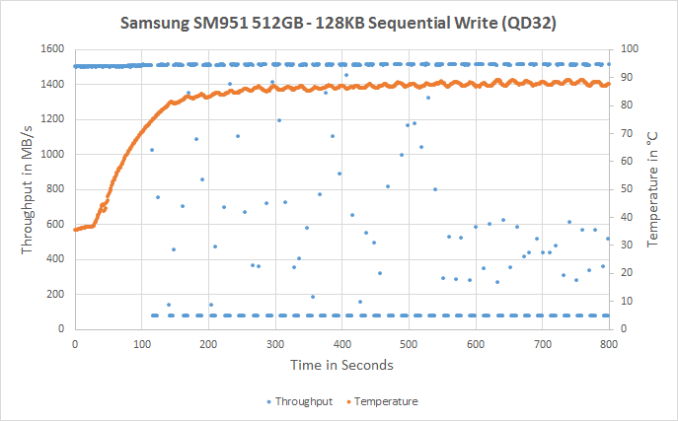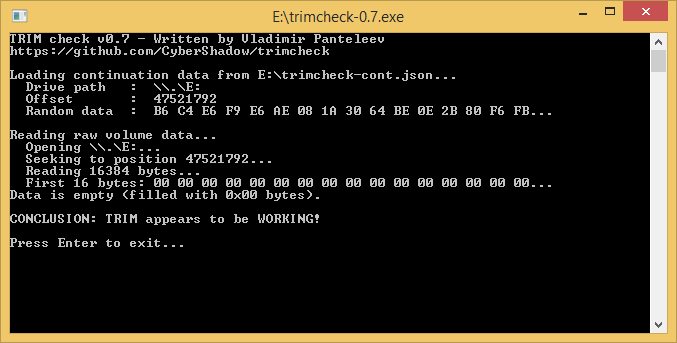Samsung SM951 (512GB) PCIe SSD Review
by Kristian Vättö on February 24, 2015 8:00 AM ESTThermal Throttling
In the previous pages I mentioned I have suspicions that some of the results have been affected by thermal throttling. To confirm my hypothesis, I took my datalogging multimeter and taped its thermal probe on top of the SM951's controller. Then I ran a 128KB sequential write test at queue depth of 32 and plotted the results in the graph below.
Now it's pretty clear why the performance seemed a bit low in the sequential tests. It takes less than two minutes for the drive to begin throttling itself and the performance drops to ~75MB/s. Because the SM951 is an M.2 drive, it doesn't have a chassis or heatsink to help with the heat dissipation, which combined with the fact that the SM951 is more power hungry than most SATA 6Gbps drives results in throttling issues. That said, the drive shouldn't throttle under normal usage because a continuous two-minute transfer isn't very common, but in some more IO intensive workloads with long transfers (e.g. video editing) there's a chance that performance will be affected by thermal issues.
In any case, I strongly recommend having a decent amount of airflow inside the case. My system only has two case fans (one front and one rear) and I run it with the side panels off for faster accessibility, so mine isn't an ideal setup for maximum airflow.
TRIM Validation
The move from Windows 7 to 8.1 introduced some problems with the methodology we have previously used to test TRIM functionality, so I had to come up with a new way to test. I tested a couple of different methods, but ultimately I decided to go with the easiest one that can actually be used by anyone. The software is simply called trimcheck and it was made by a developer that goes by the name CyberShadow in GitHub.
Trimcheck tests TRIM by creating a small, unique file and then deleting it. Next the program will check whether the data is still accessible by reading the raw LBA locations. If the data that is returned by the drive is all zeros, it has received the TRIM command and TRIM is functional.
In the case of the SM951, TRIM appears to be working properly.












128 Comments
View All Comments
3DoubleD - Tuesday, February 24, 2015 - link
While this drive looks great and all, after all the problems the 840EVO has had, it is hard to get excited about big benchmark numbers from a Samsung drive... you never know if they will stay that way. That said, this drive is MLC and not TLC, so less chance of similar issues as the 840EVO. Still, Samsung has a lot of work to repair their reputation with their customers.theduckofdeath - Tuesday, February 24, 2015 - link
Yeah, they only have a bit more than 1/4 of the market. Really suffering from that snafu... I think you're overreacting just a bit... :)3DoubleD - Tuesday, February 24, 2015 - link
How could their past sales possibly have suffered from a problem that is ongoing and developing? How future customers react will depend on whether Samsung properly addresses the current issues. My comment is based on this fact.theduckofdeath - Tuesday, February 24, 2015 - link
I have an Evo 840 and since the performance restoration fix I have not seen any sign of performance degradation on my drive. And that fix was made in October last year.theduckofdeath - Tuesday, February 24, 2015 - link
And just to clarify hwo desperate your trolling attempts are. It took (a limited number of) users a year to realise there even could be issues. That's how rare and hard to notice it was, even though the Evo 840 is probably the most sold SSD ever.K_Space - Tuesday, February 24, 2015 - link
I am not sure if you are aware, however Samsung has released a recent statement to the effect that there remain issues with the 840 EVO drive and the above fix has not provided a permenant resolution:http://www.anandtech.com/show/8997/samsung-release...
I have an XP941 and SD Extreme Pro 480; it'd sensible to see how Samsung deals with the current situation at hand which may tip me and other enthusiasts (? <5% of their SSD sales) one way or the other.
extide - Tuesday, February 24, 2015 - link
Not really, Samsung has many other great drives, even older ones that are/were still great like the 830, 840 pro, etc. Couple teething issues on early TLC drives, thats pretty much what to expect ion this industry. The MAIN thing is that they are infact handling it, and not just shuffling it under the rug. IMHO thats far more important than anything else.smilingcrow - Wednesday, February 25, 2015 - link
"The MAIN thing is that they are in fact handling it"The MAIN thing for me is when they have HANDLED it and the solution sticks over time as only then would I trust one of their TLC drives again.
If that fails I expect a product recall which they haven't offered on the vanilla 840 yet which seemingly still has no fix. No recall = NOT handling it.
3DoubleD - Wednesday, February 25, 2015 - link
Teething issues - OK, that's fine, as long as they fix them, and that's all I've been saying; however, the verdict is still out as to whether they have fixed them or not, and that was my initial point.The minute they apply a permanent firmware fix or, if a firmware fix is not possible, a recall, then they will have handled it and I'd feel future Samsung purchases were justified. This obviously applies most strongly for Samsung TLC products, but how Samsung responds to SSD issues in general should be of interest of any current and potential Samsung SSD owner (TLC or MLC).
cm2187 - Tuesday, February 24, 2015 - link
What problems are you referring to?